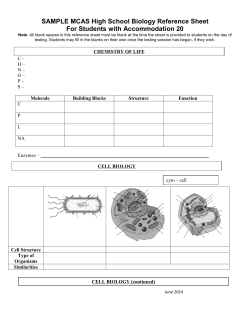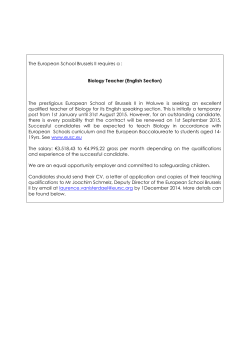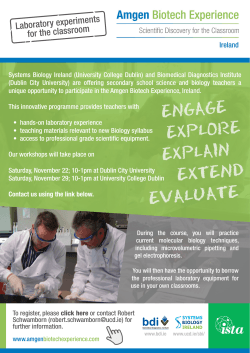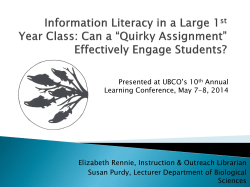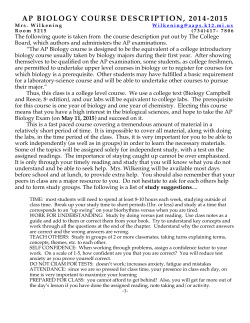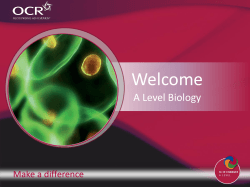
brochure
Professional Development Workshop @ Northwestern You are invited to apply to the BioBuilding2015 workshop @ Northwestern. This three day professional development opportunity will prepare educators to bring biological engineering and synthetic biology into their classrooms and laboratories. The workshop will include: • Lectures that connect the engineering/science/math and technology aspects of these fields. • Labs and classroom activities taught from the online www.BioBuilder.org resource. • Activities that address human practice questions such as the safety, security, economics and wisdom of engineering novel biological systems. • Activities that address the nuts and bolts of running a BioBuilder BioDesign Club or an iGEM team. This workshop will run from Aug 5th – 7th, 2015. Attendees will receive lunch each day and 45 PDPs or 18 CPDUs. We request attendees try to implement a BioBuilder activity in the 2015-2016 academic year and provide feedback on the effort. Who should apply? This workshop is intended for: • High school Biology teachers, especially those looking for new ways to teach the AP content or for compelling material to teach college-bound students after the AP exam is completed. • College-level instructors looking for classroom and lab curricula to include in a biotechnology-style class. • Science Club leaders, in particular anyone looking for ways to bring cuttingedge content to students with a variety interests from math to biology to electronics. FAQs • • • This workshop is free to teachers thanks to sponsorship by Baxter Int’l Inc Teachers receive full tuition, lunch each day, and written materials. Pre-registration is required for all participants, as space is limited. FOR MORE INFORMATION and to register, visit The Biotechnology Center for Excellence (BCOE) http://www.bcoe.net/content/bcoe-guest-workshop-biobuilder What is Synthetic Biology? Synthetic Biology is an emerging field that applies engineering and mathematical principles to the development of novel biological systems. These principles and technologies extend the teaching of molecular genetic techniques into real world, authentic applications. Examples of synthetic systems include bacteria that smell like bananas, and light-sensitive bacteria that can serve as pixels in a photograph. These teachable systems are included in the curriculum at Biobuilder.org. Why teach Synthetic Biology? Synthetic biology provides teachers and students an engineering context to learn molecular biology, genetic engineering and microbiology methods. This approach asks students to learn while designing, or testing designs of, engineered biological systems. In addition, this approach provides science teachers with a means of exploring numerous state and national technology standards that are hard to address in most science classes. Who’s teaching BioBuilding2015 Jessica Perez Jessica Perez is a Chemical Engineering PhD student at Northwestern University. While at Northwestern, Jessica received the NSF Graduate Research Fellowship and the NIH IMSD graduate fellowship. She currently directs the Mentorship Opportunities for Research Engagement (MORE) program. Jessica is also actively involved in various outreach projects that help K-12 teachers bring synthetic biology into their classrooms. Tom Martinez Tom Martinez has recently completed his 34th year as a biology instructor. He currently teaches AP Biology and Biotechnology at Glenbard East High School in Lombard Illinois. He has taught the BioBuilder curriculum for the past three years after participating in the BioBuilder workshop at UC Berkeley. Tom also lead a BioBuilder after school club that presented their posters at the BioBuilder Club Summit in Cambridge Mass. SPONSORS:
© Copyright 2025


